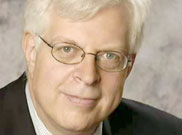
|
 |
Townhall...
Why Don’t Christians
Help ... Christians?
By Dennis Prager
In 1969, at the age of 21, I was sent to the Soviet Union. I was a
young American Jew who spoke Hebrew and Russian and who practiced
Judaism. My task was to bring Jewish religious items into the Soviet
Union and the names of Jews who wished to leave the Soviet Union out of
that country. Upon returning to the United States, I became the
national spokesman for the Student Struggle for Soviet Jewry, one of
the most effective organizations for Soviet Jews in the world.
As such, I spoke before synagogues of every denomination, Hadassah
groups, Jewish federations, Jewish groups on college campuses. If there
was a Jewish organization, it cared about the plight of Soviet Jews.
For decades, virtually every synagogue in America had a “Save Soviet
Jewry” sign in front of it.
Over time, the plight of the Soviet Jews awakened me to the plight of
all Soviet dissidents, whether secular ones -- such as that great man,
the physicist Andrei Sakharov -- or Christian.
The latter were particularly persecuted. Though my work was with Soviet
Jewry, I had no trouble acknowledging that Soviet Christians often had
it worse. Few Soviet Jews were killed or locked away in dungeon-like
conditions by the Soviet authorities, but Soviet Christians were.
At some point in my early years, it dawned on me that I had not seen a
single church with a “Save Soviet Christians” sign. Even more
amazingly, I encountered Christian clergy -- Catholic, Protestant,
Orthodox -- at every one of the scores of Soviet Jewry rallies at which
I spoke. But while these wonderful Christians were outspoken on behalf
of Soviet Jews, they were nearly all silent regarding -- or even simply
ignorant of -- the dire plight of Soviet Christians.
Making matters worse, the world’s most famous Christian evangelist, the
Rev. Billy Graham, went to the Soviet Union in 1982, and in his talk at
a church told Christians to obey the authorities -- the same
authorities who were rounding up Christian dissidents inside and
outside the very church at which Graham spoke. As columnist George Will
wrote at the time:
“The Washington Post reports that when Graham spoke in two churches,
both ‘were heavily guarded, with police sealing off all roads leading
to them. Hundreds of KGB security agents ... were in the congregation.’
Graham told one congregation that God ‘gives you the power to be a
better worker, a more loyal citizen because in Romans 13 we are told to
obey the authorities.’ How is that for a message from America? Graham
is America’s most famous Christian. (Aleksandr) Solzhenitsyn is
Russia’s. The contrast is instructive.”
This history is repeating itself.
In the Muslim world, Christians are being murdered, churches are being
torched, entire ancient Christian communities -- the Iraqi and
Palestinian, for example -- are disappearing. And, again, 2 billion
Christians react with silence. There are some Christian groups active
on behalf of persecuted Christians around the world. They do important
work, and are often the primary source of information on persecuted
Christians. But they would be the first to acknowledge that the
Christian world is overwhelmingly silent when it comes to the
persecution of Christians in the Muslim world.
This is true despite the fact that the most powerful Christian in the
world, Pope Benedict XVI, has not been silent. For example, on Jan. 10,
in his annual address to the Vatican diplomatic corps, he spoke of “the
Christian communities in (the Middle East) which suffer greatly because
of their fidelity to Christ and the Church ... the attacks which
brought death, grief and dismay among the Christians of Iraq.”
He appealed directly to the Muslim world: “To the Muslim religious
leaders I renew my heartfelt appeal that their Christian
fellow-citizens be able to live in security.”
He continued: “In Egypt, too, in Alexandria, terrorism brutally struck
Christians as they prayed in church. ... Regarding the states of the
Arabian Peninsula, where numerous Christian immigrant workers live, I
hope that the Catholic Church will be able to establish suitable
pastoral structures.”
He wasn’t done: “Particular mention must be made of the law against
blasphemy in Pakistan. I once more encourage the leaders of that
country to take the necessary steps to abrogate that law.”
And even more: “Violence against Christians does not spare Africa.
Attacks on places of worship in Nigeria during the very celebrations
marking the birth of Christ are another sad proof of this.”
Again, eight days earlier, the pope announced: “Yesterday morning we
learned with sorrow the news of the serious attack on the Christian
Coptic community in Alexandria, Egypt. This despicable act of death --
like the current trend of setting bombs close to the homes of
Christians in Iraq to force them to leave -- offends God and the whole
of humanity.”
But aside from the pope and some activist groups, the Christian world
is as silent today as it was when Christians were imprisoned and killed
in the Soviet Union.
It is time to change this pattern. Christians should organize an
international day or week of solidarity for persecuted Christians in
the Muslim world. And not only Christians should attend these hopefully
large events. Jews and Muslims should also be in attendance, and their
representatives should speak. Jews should because it is right and
because of all Christians did for Soviet Jewry and do for Israel; and
Muslims should because it is right and because nothing would protect
the good name of Muslims like joining non-Muslims in voicing solidarity
with the many Christian victims of persecution in Muslim countries.
Read it at Townhall
|
|
|
|

